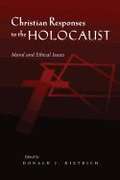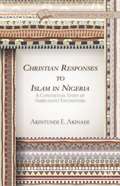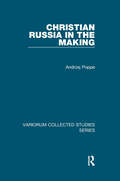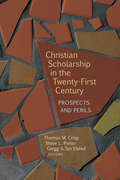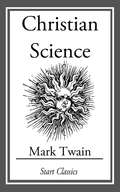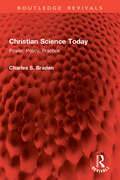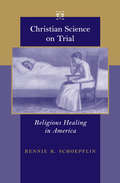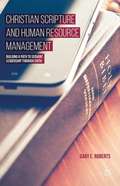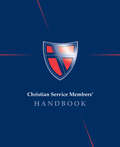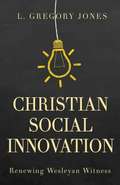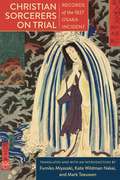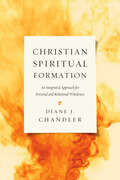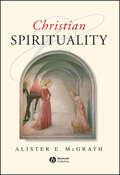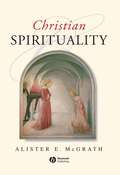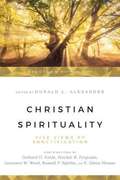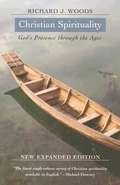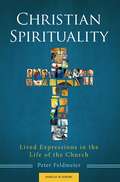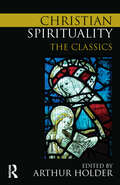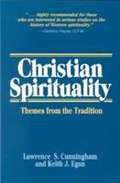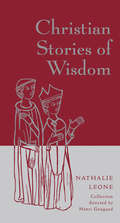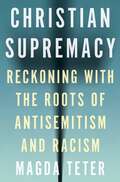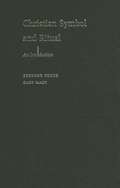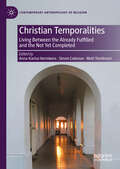- Table View
- List View
Christian Responses To The Holocaust
by Donald J. DietrichThese essays focus on the Christian responses to Nazism and delineate the roles that individuals and their churches played in confronting Hitler.
Christian Responses to Islam in Nigeria
by Akintunde E. AkinadeThis book examines the various Christian responses to Islam in Nigeria. It is a study of the complex, interreligious relationships in Nigeria. Using a polymethodic approach, the book grapples with many narratives dealing with interreligious competition and cooperation in Nigeria.
Christian Russia in the Making (Variorum Collected Studies #867)
by Andrzej PoppeThe present collection of studies by Andrzej Poppe in many ways represents a continuation of the research brought together a quarter century ago in the author's previous Variorum volume. The focal themes are the political circumstances of the 'baptism of Russia' and the processes by which Rus' became a Christian country, an era marked by the emergence of indigenous saints in royal and monastic garb. Relations with the Byzantine world, both political and ecclesiastical, are often to the fore, but as Poppe shows, those with the West, from the Carolingians onwards, were important too. Many of the articles are provided with additional notes, and the volume includes three pieces previously unpublished in English, including an introductory survey of the Rurikid dynasty, and a major new study of the process by which Vladimir the Great became a saint.
Christian Scholarship in the Twenty-First Century: Prospects and Perils
by Thomas M. Crisp Steve L. Porter Gregg Ten ElshofThe Christian tradition provides a wealth of insight into perennial human questions about the shape of the good life, human happiness, virtue, justice, wealth and poverty, spiritual growth, and much else besides -- and Christian scholars can do great good by bringing that rich tradition into conversation with the broader culture. But what is the nature and purpose of distinctively Christian scholarship, and what does that imply for the life and calling of the Christian scholar? What is it about Christian scholarship that makes it Christian? Ten eminent scholars grapple with such questions in this volume. They offer deep and thought-provoking discussions of the habits and commitments of the Christian scholar, the methodology and pedagogy of Christian scholarship, the role of the Holy Spirit in education, Christian approaches to art and literature, and more. CONTRIBUTORS Jonathan A. Anderson Dariusz M. Brycko Natasha Duquette M. Elizabeth Lewis Hall George Hunsinger Paul K. Moser Alvin Plantinga Craig J. Slane Nicholas Wolterstorff Amos Yong
Christian Science
by Mark TwainChristian Science is Mark Twain's razor-sharp attack on a popular movement which was sweeping the country at the turn of the 20th century. One of the tenets of Christian Science is the healing of physical illness through prayer. Having recently lost a daughter to meningitis, Twain responded angrily to the notion that pain and sickness were easily surmounted. His deep-seated iconoclasm also caused him to take aim at Mary Baker Eddy, the founder of Christian Science, who he saw as self-promoting and fraudulent. Using all of the satire and wit for which he is famous, Twain pokes fun at a movement he feared would become a powerful force in the country.
Christian Science Today: Power, Policy, Practice (Routledge Revivals)
by Charles S. BradenFirst published in 1958, in Christian Science Today the author's aim is to see what has happened in Christian Science since Mrs. Eddy’s time. Since the founder of Christian Science passed away, much has been written about Mary Baker Eddy and her movement; but not a single full-length study has appeared on the basis of entirely objective scholarship. It is the purpose of this book to remedy that lack.The book raises fundamental questions like- has the essential nature of her teaching been modified? Are there any trends in Christian Science thought today that are new, and if so, how has the Church regarded them? Have there been sectarian offshoots? What has become of them? How is the Church dealing currently with those who hold views supposedly at variance with the official views?The author is deeply respectful of the values in the faith founded by Mrs. Eddy, and he states fully and fairly the facts he has learned about Christian Science, the Church, and those who direct it. In his thorough documentation he relies on both official and unofficial sources, including a vast amount of unpublished material. This is an important historical reference work for scholars of Christianity and religion.Due to modern production methods, it has not been possible to include two fold-out image plates within the book. Any purchasers of the book will be able to receive a free pdf of the relevant pages by contacting Routledge Customer Services https://www.routledge.com/contacts/customer-service
Christian Science on Trial: Religious Healing in America (Medicine, Science, and Religion in Historical Context)
by Rennie B. SchoepflinIn Christian Science on Trial, historian Rennie B. Schoepflin shows how Christian Science healing became a viable alternative to medicine at the end of the nineteenth century. Christian Scientists did not simply evangelize for their religious beliefs; they engaged in a healing business that offered a therapeutic alternative to many patients for whom medicine had proven unsatisfactory. Tracing the evolution of Christian Science during the late nineteenth and early twentieth centuries, Christian Science on Trial illuminates the movement's struggle for existence against the efforts of organized American medicine to curtail its activities.Physicians exhibited an anxiety and tenacity to trivialize and control Christian Scientists which indicates a lack of confidence among the turn-of-the-century medical profession about who controlled American health care. The limited authority of the medical community becomes even clearer through Schoepflin's examination of the pitched battles fought by physicians and Christian Scientists in America's courtrooms and legislative halls over the legality of Christian Science healing. While the issues of medical licensing, the meaning of medical practice, and the supposed right of Americans to therapeutic choice dominated early debates, later confrontations saw the legal issues shift to matters of contagious disease, public safety, and children's rights. Throughout, Christian Scientists revealed their ambiguous status as medical practitioners and religious healers. The 1920s witnessed an unsteady truce between American medicine and Christian Science. The ambivalence of many Americans about the practice of religious healing persisted, however. In Christian Science on Trial we gain a helpful historical context for understanding late–twentieth-century public debates over children's rights, parental responsibility, and the authority of modern medicine.
Christian Scripture And Human Resource Management
by Gary E. RobertsChristian Scripture and Human Resource Management provides a much-needed Christian faith-based perspective on human resources management written for both line and human resource managers using the framework of servant leadership, the mandated leadership approach used by Jesus.
Christian Service Members Handbook
by WELS Special MinistriesAre you a Christian serving in the military? This pocket-sized faith-and-worship book was written and designed to help you take God's Word with you wherever you're sent. Christian Service Members' Handbook contains: • Prayers for specific military topics and the church season • Morning and evening devotion orders • Selections of Scripture • Hymns • Portions of Luther's Small Catechism This book was developed to help you and other believers serving in the military stay strong in your faith while in battle or in dangerous situations where a pastor or fellow believer might not be available.
Christian Social Innovation: Renewing Wesleyan Witness
by L. Gregory JonesEverybody seems interested in innovation and entrepreneurship these days. Start-ups are generating new jobs, creating wealth and providing solutions to longstanding problems. People are also aware that old-line social institutions need innovative approaches that provide renewal, re-establish trust and cultivate sustainability.What do faith communities have to do with innovation and entrepreneurship? Faith communities have their own need for innovation, demonstrated in a growing interest in starting new churches, developing "fresh expressions" for gatherings of community and discussions about how to cultivate a renewed sense of mission.But do faith communities have anything unique to contribute to conversations about innovation and entrepreneurship, especially in "social entrepreneurship"? At first glance, the answer seems to be "no." Burgeoning literature on social entrepreneurship barely mentions the church or other faith-based institutions — and when it does they’re often described as part of the broken institutional landscape.Recently much of the most innovative and entrepreneurial work in these sectors has been done apart from faith communities, whether through secular non-governmental organizations (e.g., Teach for America, Knowledge is Power Program schools) or for-profit businesses (e.g., hospitals and hospices). Indeed, it is now often assumed that faith and faith communities either are irrelevant to social innovation and entrepreneurship or are a significant obstacle.We believe too many people in faith communities, and faith-based organizations themselves, turned inward. They became preoccupied with managing what already existed rather than focusing on innovative renewal of their organizations and entrepreneurial approaches to starting new ones. However, Christian social innovation, at its best, depends on a conception of hope different than the optimism that often characterizes secular endeavors, a hope that acknowledges personal and social brokenness. Further, faith communities, at their best, have embodied perseverance, often bringing people together across generations and diverse sectors to imagine how common effort and faith might overcome obstacles.Although some faith communities have lost the "at-their-best" focus, new conversations and experiments are emerging beyond the goal of starting new congregations. But they tend to be "and" conversations: faith and innovation, faith and entrepreneurship, faith and leadership. We don’t think this goes deep enough. Faith might truly "animate" social innovation and entrepreneurship. In this perspective, faith is not held at a distance from the activities of life but is instead its vital force, providing the imagination, passion and commitment that lead to transformation.
Christian Sorcerers on Trial: Records of the 1827 Osaka Incident
by Kate Wildman Nakai Fumiko Miyazaki Mark TeeuwenIn 1829, three women and three men were paraded through Osaka and crucified. Placards set up at the execution ground proclaimed their crime: they were devotees of the “pernicious creed” of Christianity. Middle-aged widows, the women made a living as mediums, healers, and fortune-tellers. Two of the men dabbled in divination; the third was a doctor who collected books in Chinese on Western learning and Christianity.This was a startling development. No one in Japan had been identified and punished as a Christian for more than a century, and now, avowed devotees of the proscribed sect had appeared in the very heart of the realm. Just decades before the arrival of Perry’s black ships and the fall of the Tokugawa shogunate, the incident reignited fears of Christians as evil sorcerers, plotting to undermine society and overthrow the country.Christian Sorcerers on Trial offers annotated translations of a range of sources on this sensational event, from the 1827 arrest of the alleged Christians through the case’s afterlife. The protagonists’ testimonies relate with striking detail their life histories, practices, and motivations. The record of deliberations in Edo and communications between Osaka and Edo officials illuminate the operation of the Tokugawa system of criminal justice. Retellings of the incident show how the story was transmitted and received. Translated and put in context by Fumiko Miyazaki, Kate Wildman Nakai, and Mark Teeuwen, the sources provide students and scholars alike with an extraordinarily rich picture of late Edo social life, religious practices, and judicial procedures.
Christian Spiritual Formation: An Integrated Approach for Personal and Relational Wholeness
by Diane J. ChandlerThis comprehensive theory and practice of Christian spiritual formation weaves together biblical and theological foundations with interdisciplinary scholarship, real-world examples, personal vignettes, and practical tools to assist readers in becoming whole persons in relationship with God and others.
Christian Spirituality: An Introduction
by Alister E. McGrathThis text fills the need for a clear, informative, helpful and well-written introduction to Christian spirituality. Includes a detailed guide to resources in spirituality available on the Internet Written by a leading theological educationalist in a clear and accessible manner Encourages active engagement with primary sources through worked case studies
Christian Spirituality: An Introduction
by Alister E. McgrathThis book aims to equip you to engage with the great spiritual riches of the Christian tradition, and it does so by introducing you to some of the great themes and texts of that tradition and encouraging and enabling you to engage with it
Christian Spirituality: Five Views of Sanctification
by Donald AlexanderThe nature of Christian spirituality has been widely debated throughout the history of the church. The doctrine of sanctification was one of the main fissures separating Luther from the Catholic Church. Even today different groups of Protestants disagree on how we draw closer to God. What distinguishes the different poisitions and what exactly is at stake in these recurring debates.
Christian Spirituality: God's Presence through the Ages
by Richard J. WoodsA brief and non-technical account of the development of Christian Spirituality in its social and historical context.
Christian Spirituality: Lived Expressions in the Life of the Church
by Peter FeldmeierThe term spirituality is often used ambiguously. Bookstores have sections dedicated to "spiritual texts," which include everything from tips for improving one's business acumen and marital communication to translations of ancient tantric poetry and primers on the discernment of spirits. Given this diversity, what does spirituality actually mean--especially for the Christian tradition? <P><P>In Christian Spirituality: Lived Expressions in the Life of the Church, Peter Feldmeier weaves together historical, theological, and experiential anecdotes and information to produce a portrait of the diverse spiritual traditions that have come to bear on Christianity through the lived witness of Christian believers. With instructive chapter introductions, review and discussion questions at the conclusion of each topic, a robust bibliography, and a straightforward chronological method, Christian Spirituality makes the diverse topic of spirituality at once comprehensive and accessible.
Christian Spirituality: The Classics
by Arthur HolderChristian Spirituality: The Classics is a unique and comprehensive guide to thirty key Christian spirituality texts. Ranging from Origen and Augustine to Jonathan Edwards, Thérèse of Lisieux and Thomas Merton, it offers a view of the texts which is founded in scholarship, but which also presents them as living documents that invite- even compel -contemplative reflection and existential response. Each chapter briefly describes the classic text's author and audience, gives a synopsis of its contents, suggests some of its influence in history, and then explores aspects of the text's meaning for readers today. Key themes include: What is the meaning of life? How can human beings find truth? How can they discover who they really are? How can they live together in peace? How can they live more fully in God's presence in this world and be united with God in the world to come? The scholars who have written these chapters are all experts on their respective topics, but they wear their learning lightly. Anyone wishing to discover the riches of Christian spirituality will find this the ideal introduction and should be able to progress to a deeper understanding of the texts themselves.
Christian Spirituality: The Classics
by Arthur HolderChristian Spirituality: The Classics is a unique and comprehensive guide to thirty key Christian spirituality texts. Ranging from Origen and Augustine to Jonathan Edwards, Thérèse of Lisieux and Thomas Merton, it offers a view of the texts which is founded in scholarship, but which also presents them as living documents that invite- even compel -contemplative reflection and existential response. Each chapter briefly describes the classic text’s author and audience, gives a synopsis of its contents, suggests some of its influence in history, and then explores aspects of the text’s meaning for readers today. Key themes include: What is the meaning of life? How can human beings find truth? How can they discover who they really are? How can they live together in peace? How can they live more fully in God’s presence in this world and be united with God in the world to come? The scholars who have written these chapters are all experts on their respective topics, but they wear their learning lightly. Anyone wishing to discover the riches of Christian spirituality will find this the ideal introduction and should be able to progress to a deeper understanding of the texts themselves.
Christian Spirituality: Themes From The Tradition
by Lawrence S. Cunningham Keith J. EganChristian Spirituality is a concise and accessible overview of the ways Christians over the centuries have approached God in prayer and practice. In ten chapters, Lawrence Cunningham and Keith Egan explain the dynamics of spiritual life, each chapter exploring a single theme such as scripture, journeying, meditation & contemplation, asceticism, mysticism, solitude & community, friendship, eucharist. The themes are not mutually exclusive since believers frequently embrace several or all of these "ways" at once. But in different times and places people have tended to focus on one or another, so that they have become discernible paths to the Holy. The authors explore each theme in depth, tracing its evolution over the centuries. Within this historical framework, the book provides the reader with a "taste" of the different ways Christians have sought or lived in the presence of God. Each chapter concludes with a list of selected works for further reading and with exercises intended to provide a personal experience of the "way".
Christian Stories of Wisdom
by Nathalie LeoneA beautifully illustrated collection of old-world Christian tales of faith and morality. Christian Stories of Wisdom is the perfect antidote to our busy, modern lives. It serves as a daily companion that one can return to again and again for a moment of spiritual sustenance. The 70 stories in this uplifting collection can be read in solitude or shared with others. Among them are "Saint Francis and the Wolf," "Saint Peter's Mother," "The Mantle of Christ," "The Angel and the Hermit," and many others. Nathalie Leone has been an actress, mask creator, puppeteer, and storyteller. Along with her career in the performing arts, she is the author of Souffle, a collection of poems, and several children's stories. She lives in France.
Christian Supremacy: Reckoning with the Roots of Antisemitism and Racism
by Magda TeterA panoramic cultural and legal history that traces the roots of antisemitism and racism to early Christian theologySince the earliest days of Christianity, theologians expressed pervasive anxiety about Jews as equal members of society, and, with European expansion in the early modern period, that anxiety extended to people of color. This troubling legacy still haunts us today. Christian Supremacy demonstrates how theological and legal frameworks created by the church centuries ago laid the seeds of antisemitism and anti-Black racism and reveals why Christian identity lies at the heart of the world’s violent white supremacy movements.In a powerful historical narrative spanning nearly two millennia, Magda Teter describes how Christian theology of late antiquity cast Jews as “children born to slavery,” and how the supposed theological inferiority of Jews became inscribed into law, creating tangible structures that reinforced a sense of Christian domination and superiority. With the dawn of European colonialism, a distinct brand of European Christian supremacy found expression in the legally sanctioned enslavement and exploitation of people of color, later taking the form of white Christian supremacy in the New World.Drawing on a wealth of primary evidence ranging from the theological and legal to the philosophical and artistic, Christian Supremacy is a profound reckoning with history that traces the roots of the modern rejection of Jewish and Black equality to an enduring Christian heritage of exclusion, intolerance, and persecution.
Christian Symbol And Ritual: An Introduction
by Bernard J. Cooke Gary MacyIn Christian Symbol and Ritual, Bernard Cooke and Gary Macy offer an accessible and engaging introduction to the topic written from a non-denominational perspective. Cooke and Macy demonstrate that celebration, ritual, and symbol are already central to our lives, even though most do not seetheir actions as symbolic or ritualistic. They connect central Christian symbols to the symbols and rituals already present in everyday life and place Christian theology in a familiar context. After discussing the characteristics and functions of rituals, they explore different kinds of ritual,including those of friendship, worship, and healing. The authors also examine such questions as how rituals establish and maintain power relationships, how "official" rituals are different from "popular" Christian rituals and devotions, and how Christian rituals function in the process of humansalvation. Christian Symbol and Ritual is an invaluable resource for students, teachers, and lay readers.
Christian Temporalities: Living Between the Already Fulfilled and the Not Yet Completed (Contemporary Anthropology of Religion)
by Simon Coleman Matt Tomlinson Anna-Karina HermkensThis volume explores how different forms of Christianity shape people's visions of pasts and futures, and how the transcendent is brought into human time. Beyond conventional discussions around breaks with the past in Christian conversion and future ruptures announced in prophecy, the volume reveals previously unexplored ways in which Christians work with concepts of time and its articulation with divinity, subjectivity, agency, and personal, social, and political change. By developing Coleman’s argument about “historiopraxy” in novel directions, contributors provide new understandings of religious temporalities and the ritual articulation of immanence and transcendence. While building upon previous scholarly work in the anthropology of Christianity, this volume pushes the debate further and provides original insights into how religion is mobilised to shape and transform people's pasts, presents and futures.
